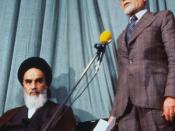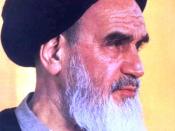4/26/07 "Fundamentalism" - An Orientalist Approach to Islam
One of the major sources of controversy between the West and Islam has been the portrayal of Islam as a "fundamentalist" society. Due to this stereotype, Islam has been categorized as extremist, backwards, anti-modern, and traditional. Edward Said, a world renown Palestinian-American scholar, argues that one "can readily equate Islam with almost any Muslim: Ayatollah Khomeini is the readiest candidate for this but so too are the railing Muslim mobs of Karachi, or Cairo, or Tripoli that are featured on television whenever instant examples of fundamentalism are required" (Covering Islam, 43). Regardless of the actual definition of fundamentalism, or the goals of Khomeini and the Iranian Revolution, it is easy to label one as a fundamentalist and proceed to attack his ideals. In this essay, I will argue that the label of "fundamentalism" applied by the American media and scholars to Khomeini was caused by two major factors: the lack of an understanding of Islamic ideals, and ulterior political motivations.
I will then explore Islam's portrayal of the West as a materialistic and imperial power as a defensive response. Finally, I will conclude that these two factors are both caused by Orientalism, "a Western style for dominating, restructuring, and having authority over the Orient" (Orientalism, 3).
The labeling of "fundamentalism" by Western scholars and the media is partly due to the failure to obtain accurate information about Islam. Consider Judith Miller, a woefully under-qualified reporter for the New York Times assigned to report on Islam. Said argues, "it would be impossible to be taken seriously as a reporter or expert on Russia, France, Germany, or Latin America, perhaps even China and Japan, without knowing the requisite languages, but for 'Islam' no linguistic knowledge seems to be necessary" (...


